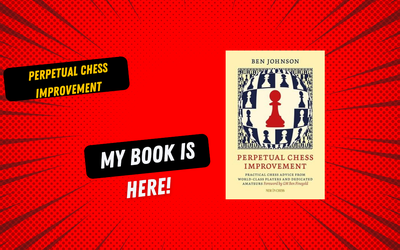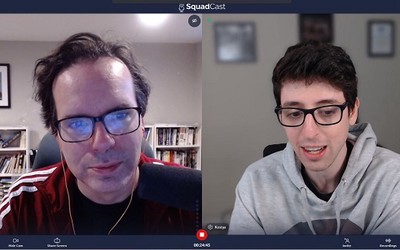
3 Conclusions and 3 goals from a Data Analysis of my 24 Recent Tournament Games
Using Data to Assess "The State of My Chess Game"After a lengthy hiatus, I have been back in the OTB streets in past months with a goal of playing 50 rated games this year. There is nothing magical about the 50 games, but the number has always stuck with me, because it was prescribed as a minimum goal for an ambitious tournament player by IM John Donaldson in our 2017 interview, and the same number was echoed as parting advice by GM Jan Markos in his amazing book for intermediate to advanced players, Under the Surface.
Covid cancellations have slowed down my pace a bit, but last July, I played in my first tournament in 3 years, and I have now played a total of 24 rated games since then. As I write this, I am headed to another tournament this weekend, so I thought it was a good time to gather some data from my games and tentatively draw some conclusions.
Today I made a spreadsheet that tracks some data from these games. There is lots one could measure, but I settled on the following things: opponent, result, color, opening, engine evaluation after 15 moves, avg. centipawn loss in the game, along with a column for a few thoughts on what the key factors were that decided the outcome of each game. For context, I began my heroic OTB comeback with a USCF rating of 2101, with a long term goal of working my way back to 2200.
My competition has primarily been rated in the 1900 to 2300 USCF range, and so far I have scratched and clawed my way to regaining 19 points, but with plenty of hiccups along the way. Some of my conclusions and goals will be rather specific to my own game, but hopefully some observations can be thought provoking and actionable for you all as well. Let's dig in.
Conclusion #1- Openings don’t matter!
OK, maybe they matter a little bit. My friend, FM Nate Solon has written convincingly on the proper weight of openings for amateurs, and my own data agrees with it. In looking at the evaluation graphs of my games, I am struck that in the majority of my games, the advantage (defining it here as +1/-1 or better) was very often passed back and forth within a game. In the 17 decisive games in the data set, 11 were won by a side that was 1 point or more worse at some point, and sometimes it was a much bigger comeback than that. Even in the other games, the result usually teetered at times between a draw and a win. This relates to openings, because these evaluation shifts provided opportunities to change one’s fortune well after the first 15 moves. On a side note, after 15 moves, my average evaluation with White was +.51, and with Black it was -.14, so even though I always feel like my openings suck, and I often felt unprepared at the board, my opponents’ opening knowledge might suck more!
Conclusion #2- Stop Playing Like a Coward!
From my prior data points, you might ask why my opponent’s and I have blown so many advantages. I can’t speak for my opponents, but in my case, there is a noticeable failure to step on someone’s neck once I have them down. My coach has also been harping on this point, and it is definitely noticeable when I review my games in quick succession. As we get older, we become more risk averse, and unfortunately, I have noticed a shift in my chess game in recent years. When I have an advantage these days, I tend to be overly prophylactic and a few times have dawdled rather than taking the proper aggressive line. Fixing this will be a long term process, but I have already noticed that awareness of this issue helped a bit in my last tournament
Conclusion #3- People almost always mess up eventually!
Good positions, bad positions, you know I’ve had my share. We have already discussed the issues I’ve had converting advantages. Conversely, when I have gross positions I have a tendency to act as if I can think my way out of it. Sometimes your position sucks and sitting there for 15 minutes on your turn won’t change that. The best thing to do is make a decent move quickly, so that if your opponent eventually messes up you won’t be too short on time to appropriately capitalize.
On to my goals for this weekend’s tournament.
Goal #1- Please Ben, for the Love of God, Play Quickly in the Opening
My games simply aren’t being decided in the first 15 moves. I want my goals to be S.M.A.R.T, so I specifically would like to spend no more than 15 minutes on my first 15 moves. Honestly, I should probably have a more aggressive goal than this, but I had this goal at my last tournament, and only it achieve it 2 out of 4 times, so let's start small. Even beyond the opening, I could stand to play faster at times. GM Jan Markos mentions that games are often decided “when the pieces come into contact” so even beyond move 15 I hope to be aware of quiet positions and make a conscious effort to play faster in them.
Goal #2- Err on the Side of Aggression
OK fine, I’ll admit it, this is not does not fit the definition of a S.M.A.R.T goal because it is not measurable. But I need to play more aggressively, so we are just going to have to use some judgment for this one. Specifically in inevitable moments where I am consciously aware that I have an aggressive choice and a more cautious one that both look reasonable, my opponent’s best buckle up!
Goal #3- Up Your Centipawn game!
What is the best way to measure chess performance over a small sample? Performance rating is too noisy. "Just have fun"? Don’t be ridiculous! Should we measure our performance analytically at all when one is just playing 4 games? I don’t know, but overall in my 24 recent tournament games my average centipawn loss, as measured by the LiChess game analysis feature is 34. I won’t live and die by this goal, but long term, I would like to move this number lower. Aside from any tactical and strategic improvement, so much of competitive chess is about decision making and avoiding terrible moves. If I am a bit more practical with time management, keep up some calculation daily practice and continue to slowly improve my opening repertoire over time I hope to eventually see a few centipawns melt away from my average loss.
Wish me Luck!
Thanks for reading this "state of my chess game" address. I hope to write in the next week or two to let y’all know how I did with these goals in my imminent tournament. Good luck with your own games!
More blog posts by PerpetualChess

My Book is Out Today! Here Are a Few More Things I Wish I Included In It
Improving Perpetual Chess Improvement
Life and Chess Improvement Lessons from GM Simen Agdestein
Magnus Carlsen’s Childhood Coach on the Joys of Keeping Things Simple
GM Michael Adams and Philip Hurtado on How to "Think Like a Super GM"
An Excellent new chess book puts a 21st century spin on the research of Adriaan de Groot